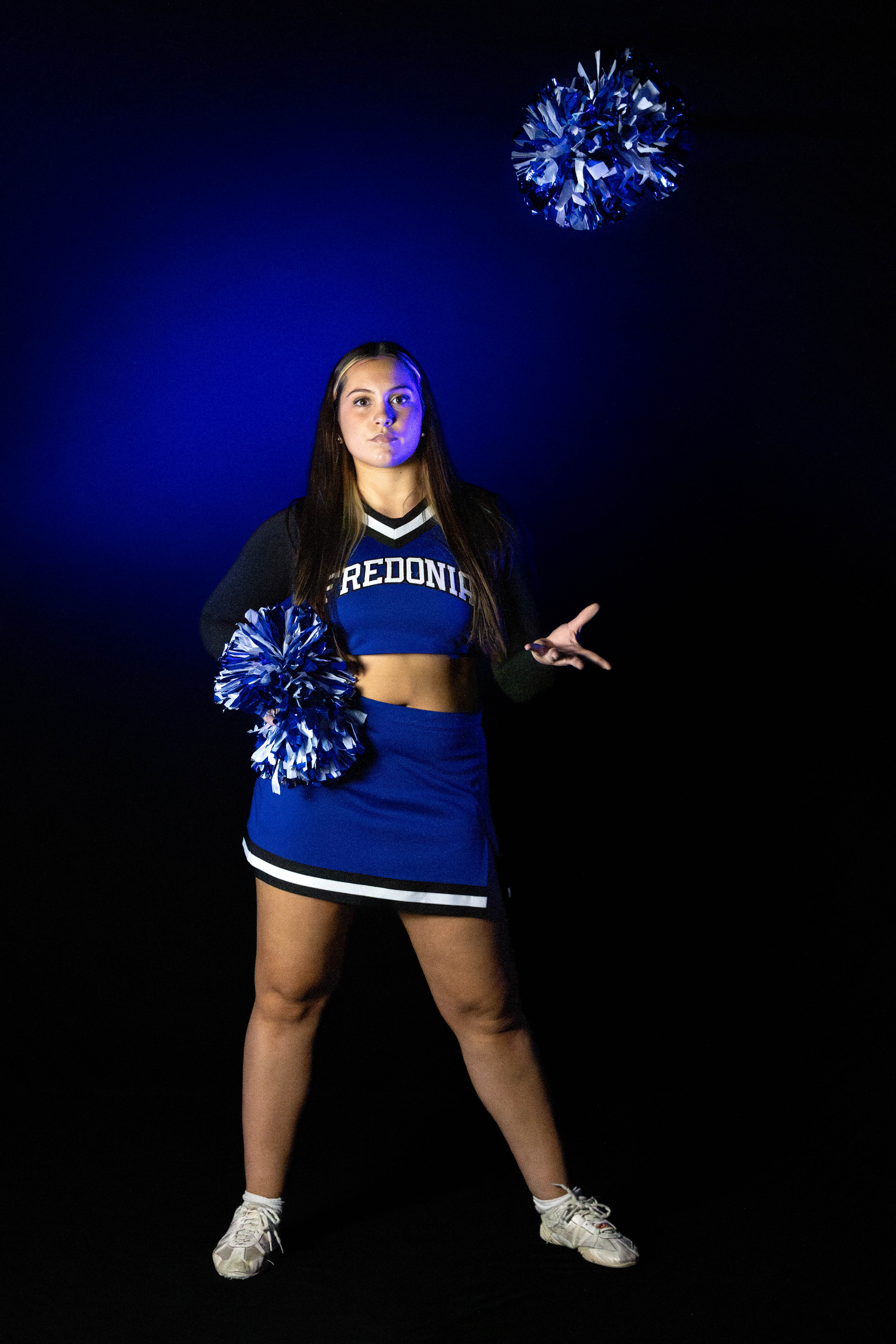HAILEY GARRISON
Special to The Leader

Photo by BECCA TORNCELLO | Sports Photographer
Cheerleading is more than just a sport; it’s a testament to dedication, strength and resilience.
For Sophia DiPrima, a 19-year-old cheerleader at SUNY Fredonia, the journey has been one filled with passion, hardship and an inspiring comeback story that proves the power of perseverance.
DiPrima’s love for cheerleading began in eighth grade, where she initially took on the role of a main base.
However, it wasn’t love before she transitioned to a backspot, a position that deepened her love for the sport.
Throughout high school, she devoted countless hours perfecting her skills, developing strong bonds with her teammates and pushing herself to new heights.
When the time came to choose a college, continuing her cheerleading career was a no-brainer.
“I chose to continue my cheer path [at] SUNY Fredonia because I love the sport,” DiPrima shared. “I was excited to continue cheering in college and start a new experience.”
DiPrima’s freshman year took an unexpected turn on a cold winter night, just after the season’s first snowfall.
Unfamiliar with certain parts of campus, she led her friends down a path where she suddenly slipped on ice while running.
As she twisted her ankle and fell, she immediately knew something was terribly wrong.
“I saw the next eight months flash before my eyes,” she recalled. “I knew we left for Daytona in four months, and I didn’t even know the extent of my injury.”
An ambulance rushed her to the hospital, where an X-ray revealed a broken fibula.
However, that was only the beginning of her medical struggles.
Upon returning home to Rochester, a specialist informed her that she had also torn more than half of the ligaments in her foot, making it completely unstable.
The prognosis was grim — she needed surgery, and her chances of competing in Daytona were nearly nonexistent.
The surgery itself lasted four to five hours. When DiPrima woke up, her leg was numb from anesthesia.
A couple of hours later, the pain that followed was unbearable — a stark contrast to the adrenaline-fueled cheer practices she was used to.
“I woke up in the middle of the night with my leg on fire,” she said. “I cried from the pain and frustration. Just two weeks before, I was having a normal day at cheer practice, and now I was stuck in bed, screaming in pain.”
Beyond the physical agony, the mental toll was equally challenging.
Having to relearn basic tasks — showering, getting dressed, even sleeping — was frustrating.
Watching her teammates train while she sat on the sidelines only deepened her heartbreak.
The countdown to Nationals in Daytona loomed over her, a constant reminder of what she lost.
“My mental health declined because I had to learn how to do things without walking,” she said. “I couldn’t work out anymore, and I was limited in so many ways. Every practice, I counted down the days until my next recovery milestone.”
Despite the overwhelming adversity, DiPrima refused to accept the limitations placed upon her.
Determined to get back on the mat, she dedicated herself to intense physical therapy, pushing her body beyond what seemed possible.
“Once I was able to take my walking boot off, I wore a brace,” she explained. “Every single day, I went to physical therapy and pushed through my exercises. I pushed and pushed myself to get better enough to be cleared for Daytona.”
As competition season neared, the idea of returning to the mat became more than just a distant dream.
Cheerleading coach Julie Troche remained open to the possibility, but everything depended on DiPrima’s clearance from the physical therapist.
One week before leaving for Daytona, she finally received the news she had been praying for — she was cleared to compete.
“I ran to my coach and told her the news. She let me work with my group again, and the feeling of hitting our stunt almost immediately after stepping back on the mat was the best feeling in the world,” she said. “I was so happy and proud of myself for being able to bounce back like this.”
DiPrima’s triumphant return wasn’t without its struggles. Jumping back into a high-intensity routine after months of immobility was brutal.
Pain became her constant companion, but she refused to let it stop her.
“I was in pain every day,” she admitted. “I jumped back into our routine after not being able to walk for two months. I probably should’ve given myself more time, but I knew that once we were done competing, I could ease back into life afterward.”
Practices were grueling, as her ankle throbbed with each movement.
But she pushed through, determined to finish what she had started.
She fought too hard to sit on the sidelines.
Stepping onto the mat at Nationals, DiPrima felt an overwhelming mix of emotions — joy, relief and pride.
Against all odds, she was there, competing alongside her teammates.
“The moment I took my spot on the mat, everything felt right again,” she said. “I proved to myself that I was stronger than I had ever imagined.”
DiPrima’s journey is a testament to resilience and determination.
Despite facing a setback that could have ended her season, she refused to let it define her.
She fought through the pain, pushed past the doubts and ultimately proved that passion and perseverance can overcome even the toughest obstacles.
Her story is an inspiration to athletes everywhere — proof that setbacks are just setups for comebacks.
